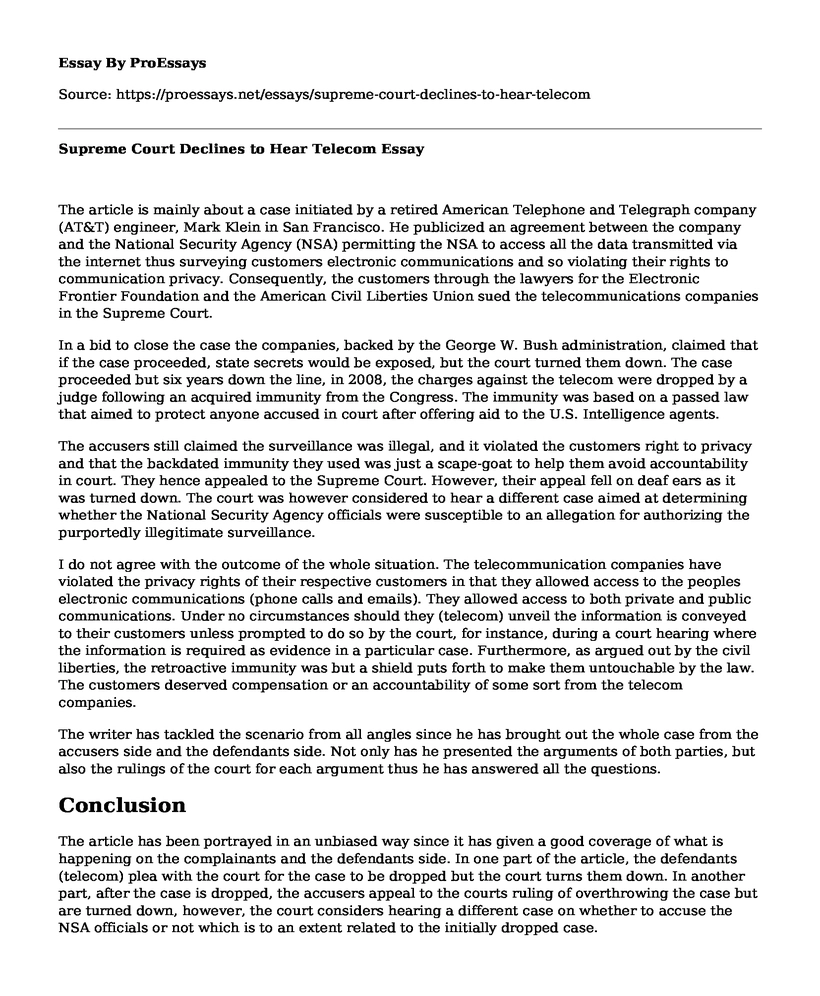The article is mainly about a case initiated by a retired American Telephone and Telegraph company (AT&T) engineer, Mark Klein in San Francisco. He publicized an agreement between the company and the National Security Agency (NSA) permitting the NSA to access all the data transmitted via the internet thus surveying customers electronic communications and so violating their rights to communication privacy. Consequently, the customers through the lawyers for the Electronic Frontier Foundation and the American Civil Liberties Union sued the telecommunications companies in the Supreme Court.
In a bid to close the case the companies, backed by the George W. Bush administration, claimed that if the case proceeded, state secrets would be exposed, but the court turned them down. The case proceeded but six years down the line, in 2008, the charges against the telecom were dropped by a judge following an acquired immunity from the Congress. The immunity was based on a passed law that aimed to protect anyone accused in court after offering aid to the U.S. Intelligence agents.
The accusers still claimed the surveillance was illegal, and it violated the customers right to privacy and that the backdated immunity they used was just a scape-goat to help them avoid accountability in court. They hence appealed to the Supreme Court. However, their appeal fell on deaf ears as it was turned down. The court was however considered to hear a different case aimed at determining whether the National Security Agency officials were susceptible to an allegation for authorizing the purportedly illegitimate surveillance.
I do not agree with the outcome of the whole situation. The telecommunication companies have violated the privacy rights of their respective customers in that they allowed access to the peoples electronic communications (phone calls and emails). They allowed access to both private and public communications. Under no circumstances should they (telecom) unveil the information is conveyed to their customers unless prompted to do so by the court, for instance, during a court hearing where the information is required as evidence in a particular case. Furthermore, as argued out by the civil liberties, the retroactive immunity was but a shield puts forth to make them untouchable by the law. The customers deserved compensation or an accountability of some sort from the telecom companies.
The writer has tackled the scenario from all angles since he has brought out the whole case from the accusers side and the defendants side. Not only has he presented the arguments of both parties, but also the rulings of the court for each argument thus he has answered all the questions.
Conclusion
The article has been portrayed in an unbiased way since it has given a good coverage of what is happening on the complainants and the defendants side. In one part of the article, the defendants (telecom) plea with the court for the case to be dropped but the court turns them down. In another part, after the case is dropped, the accusers appeal to the courts ruling of overthrowing the case but are turned down, however, the court considers hearing a different case on whether to accuse the NSA officials or not which is to an extent related to the initially dropped case.
Reference
Savage, D. (2012). Supreme Court declines to hear telecom privacy-invasion lawsuit. Latimes. Retrieved 19 May 2016, from http://articles.latimes.com/2012/oct/09/news/la-pn-supreme-court-telecom-nsa-20121009
Cite this page
Supreme Court Declines to Hear Telecom. (2021, Mar 15). Retrieved from https://proessays.net/essays/supreme-court-declines-to-hear-telecom
If you are the original author of this essay and no longer wish to have it published on the ProEssays website, please click below to request its removal:
- Social Injustice Essay Example
- Reflective Essay on Criminal Law Lesson
- Essay Sample on Informants and Witnesses
- Mance v. Mercedes-Benz Case Study
- Essay on OPP Detective Utilizes Reid Technique to Compel Serial Killer's Confession
- Essay Sample on secure Computer Forensics: Investigator & Crime Lab QA/QC
- Sperm Donor Anonymity in Australia: Legal Challenges and Proposed Frameworks - Free Paper







